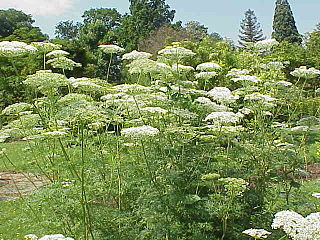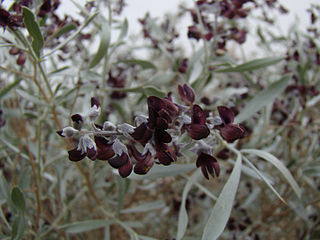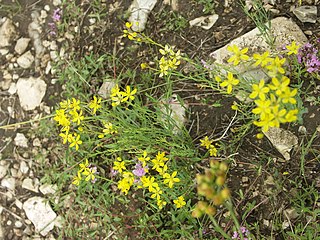
Artemisia is a large, diverse genus of plants belonging to the daisy family Asteraceae, with between 200 and 400 species. Common names for various species in the genus include mugwort, wormwood, and sagebrush.

The genus Pulsatilla contains about 40 species of herbaceous perennial plants native to meadows and prairies of North America, Europe, and Asia. Derived from the Hebrew word for Passover, "pasakh", the common name pasque flower refers to the Easter (Passover) flowering period, in the spring. Common names include pasque flower, wind flower, prairie crocus, Easter flower, and meadow anemone. Several species are valued ornamentals because of their finely-dissected leaves, solitary bell-shaped flowers, and plumed seed heads. The showy part of the flower consists of sepals, not petals.

Draba is a large genus of flowering plants in the family Brassicaceae, commonly known as whitlow-grasses.

Hedysarum (sweetvetch) is a genus of the botanical family Fabaceae, consisting of about 200 species of annual or perennial herbs in Asia, Europe, North Africa, and North America.

Caragana is a genus of about 80–100 species of flowering plants in the family Fabaceae, native to Asia and eastern Europe.

Cnidium is a genus of flowering plants in the family Apiaceae, native to Eurasia and North America.

Conioselinum is a genus of flowering plant in the family Apiaceae, native to Eurasia and North America. Its species are erect perennial plants with deeply toothed compound leaves and umbels of white flowers. Plants of this genus are known commonly as hemlock-parsley.

Anemonoides is a genus of flowering plants in the buttercup family Ranunculaceae. Plants of the genus are native to the temperate regions of the Northern Hemisphere, on the continents of North America, Europe, and Asia. The generic name Anemonoides means "anemone-like", a reminder that many of the species were formerly included within the genus Anemone.

Quercus mongolica, commonly known as Mongolian oak, is a species of oak native to Japan, China, Korea, Mongolia, and Siberia. The species can grow to be 30 metres tall.
Laser is a genus of flowering plant in the family Apiaceae, native from Europe to northern Iran. The genus was first described in 1799.

Ammodendron is a genus of flowering plants, called the sand acacias, in the family Fabaceae. It contains five species, which range from Iran through Central Asia to Xinjiang. It belongs to the subfamily Faboideae. Its name is derived from the Greek άμμοςammos ("sand") and δένδρονdendron ("tree").

Ajania is a genus of flowering plants in the daisy family, described as a genus in 1955. The genus is native to temperate Asia, primarily Russia and China. It is named after the Russian port city Ayan in the Khabarovsk Krai region of the Russian Far East, on the coast of the Sea of Okhotsk.
Endocellion is a small genus of flowering plants in the daisy family Asteraceae.

Eutrema is a genus of flowering plants of the family Brassicaceae, native to the Holarctic. Its best known member is wasabi, Eutrema japonicum. The name comes from the Greek εὐ- (eu-) 'well' et τρῆμα (trêma) 'hole', because of a hole in the septum of the fruit.

Haplophyllum is a genus of flowering plants belonging to the family Rutaceae. It is the only genus in the subfamily Haplophylloideae.













